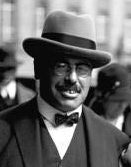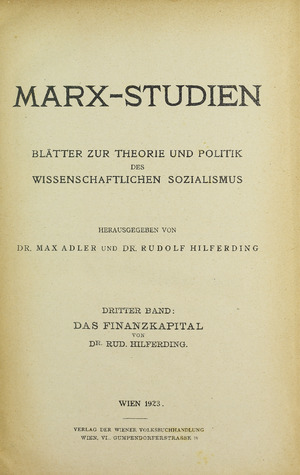Rudolf Hilferding facts for kids
Quick facts for kids
Rudolf Hilferding
|
|
|---|---|

Hilferding in 1928
|
|
| Minister of Finance (Weimar Republic) |
|
| In office 13 August 1923 – October 1923 |
|
| Preceded by | Andreas Hermes |
| Succeeded by | Hans Luther |
| In office 29 June 1928 – 21 December 1929 |
|
| Preceded by | Heinrich Köhler |
| Succeeded by | Paul Moldenhauer |
| Personal details | |
| Born | 10 August 1877 Leopoldstadt, German Empire |
| Died | 11 February 1941 (aged 63) Paris, German-occupied France |
| Political party | Social Democratic Party of Germany |
| Alma mater | University of Vienna |
| Occupation | Politician |
Rudolf Hilferding (born August 10, 1877 – died February 11, 1941) was an important economist and politician from Austria. He was a leading thinker for the Social Democratic Party of Germany (SPD) during a time in Germany called the Weimar Republic. He was also a doctor!
He was born in Vienna and studied medicine to become a doctor. Later, he became a top journalist for the SPD. He was even Germany's Finance Minister twice, in 1923 and again from 1928 to 1929. In 1933, he had to leave Germany. He lived in Zurich and then Paris, where he died while in custody in 1941.
Hilferding believed in the economic ideas of Karl Marx. He was the first to talk about "organized capitalism". He also defended Marx's ideas against other economists. Hilferding edited important newspapers like Vorwärts and Die Freiheit. His most famous book was Das Finanzkapital (Finance Capital). This book greatly influenced other Marxist writers like Vladimir Lenin.
Contents
Biography
Early Life in Vienna
Rudolf Hilferding was born on August 10, 1877, in Vienna, Austria. His family was Jewish and well-off. His father, Emil Hilferding, was a merchant. Rudolf also had a younger sister named Maria.
He went to a public high school and then studied medicine at the University of Vienna. Even before finishing school, in 1893, he joined a group of students. They met weekly to discuss socialist books. This group later became a student organization.
Here, Hilferding first learned deeply about socialist ideas. He also became active in the labour movement. The group even took part in protests, which got the attention of the Social Democratic Party of Austria (SPÖ).
As a university student, he met many smart socialist thinkers. Besides medicine, he studied history, economics, and philosophy. He and his friends, like Karl Renner and Otto Bauer, also studied economics. They learned from Marxist teacher Carl Grünberg. Hilferding became a strong supporter of Victor Adler, who started the SPÖ.
Becoming a Doctor and Writer
In 1901, Hilferding finished his medical studies and became a paediatrician (a children's doctor). But he was more interested in economics. He spent his free time studying it. He also joined the Social-Democratic Party in Austria.
In 1902, he started writing for the Social-Democratic newspaper Die Neue Zeit. He wrote about economic topics. Karl Kautsky, a very important Marxist thinker, asked him to write. Hilferding and Kautsky became good friends.
Hilferding's writings made him a leading socialist thinker by 1905. He became close with the leaders of both the Austrian and German Social Democratic Parties. With Max Adler, he started and edited Marx-Studien. These were important studies that spread Austromarxism.
In 1903, Hilferding, Renner, and Adler started a group. It aimed to improve workers' education. They opened Vienna's first school for workers.
Hilferding married Margarete Hönigsberg, who was also a doctor. She was involved in the socialist movement. They had a son named Karl Emil. Kautsky encouraged Hilferding to focus on his writing. He helped him get a teaching job in Berlin.
Life in Berlin and World War I
In 1906, Hilferding stopped being a doctor. He moved to Berlin to teach economics at the SPD's training center. He taught for one term. However, a law said that teachers needed to be German citizens. So, he had to leave this job in 1907. Rosa Luxemburg took his place.
Until 1915, he was the foreign editor for Vorwärts, the main SPD newspaper. This put him close to the most important party leaders. He quickly became a leader at the paper and was made editor-in-chief. This job, along with his work for Die Neue Zeit, gave him a good income.
In 1910, he published his most famous book, Das Finanzkapital (Finance Capital). This book was a big step in economic theory. It made Hilferding known as an important economist. It also helped him rise to a top position in the SPD.
When World War I started in 1914, Hilferding was one of the few who disagreed with the SPD's support for the war. He was part of a small group that opposed the party's decision. In October 1915, the SPD leadership fired editors who disagreed. But Hilferding had already been called to serve in the Austro-Hungarian Army as a medic.
He was first stationed in Vienna, where he worked in a hospital. He lived with his wife and two sons, Karl and Peter. In 1916, he was sent to the Italian border as a combat medic. During the war, Hilferding kept writing and stayed involved in politics. He wrote many articles. One article, from October 1915, talked about his idea of "organized capitalism."
The Weimar Republic Years
In 1918, Hilferding joined the Independent Social Democratic Party of Germany (USPD). This party was against the war. After the German Revolution of 1918–19 in November 1918, he returned to Berlin. He became the editor-in-chief of the USPD's newspaper, Die Freiheit. This newspaper became very popular in Berlin.
Hilferding was part of a committee to discuss socializing (making industries public) suitable businesses. He spent months on this project. However, the government was more focused on ending the war and feeding the people. So, this committee was stopped in April 1919.
Tensions grew between the SPD and USPD. The USPD left the government. Hilferding supported this decision. After the USPD did not do well in the elections in 1919, Hilferding and other leaders started to support workers' councils.
Hilferding disagreed with the Bolsheviks and their leader, Lenin. He was against the October Revolution in Russia. He later described the Soviet Union as a "totalitarian state."
In 1919, he became a German citizen. In 1922, he strongly opposed the USPD joining the Communist Party of Germany. Instead, he supported the USPD joining back with the SPD. He became a very important spokesperson for the SPD.
During a time of high inflation in Germany, he became the Finance Minister of Germany from August to October 1923. He helped to stabilize the German currency. He resigned shortly before a big monetary reform happened.
From 1924 to 1933, he published the journal Die Gesellschaft. On May 4, 1924, he was elected to the Reichstag (the German parliament). He was the SPD's main speaker on money matters until 1933. He also helped write the Heidelberg Program in 1925.
He served as finance minister again from 1928 to 1929, just before the Great Depression. He had to leave this job because of pressure from the head of the Reichsbank.
Life in Exile and Death
When Adolf Hitler came to power in 1933, Hilferding had to flee Germany. He was a prominent socialist and Jewish. He went to Denmark, then Saarbrücken, Paris, and finally Zurich, Switzerland. He lived in Zurich until 1938, and then in Paris from 1939.
He remained important in the SPD's exile group, called Sopade. From 1933 to 1936, he edited Die Zeitschrift für Sozialismu and wrote for Neuer Vorwärts. He also represented the party in the Socialist International until 1939.
After France was attacked in World War II, Hilferding tried to escape. He was arrested by the police in southern France. Despite having an emergency visa for the United States, he was handed over to the Gestapo on February 9, 1941.
Hilferding was taken to a prison in Paris called La Santé. He died there on February 11, 1941, while in custody. His death was not officially announced until later that year. Many believed he was killed by the Gestapo. His wife at the time, Rose, escaped to the United States. His first wife, Margarete, died in the Theresienstadt Ghetto in 1942.
Finance Capital Explained
Hilferding's book Finance Capital (Das Finanzkapital), published in 1910, was a very important book about economics. It looked at how capitalism was changing. He wrote about how "competitive capitalism" was becoming "monopolistic finance capital." This means that big companies and banks were joining together.
Hilferding saw that this new "finance capital" wanted the government to get more involved in the economy. This was different from earlier times when businesses wanted less government control. He believed this was a natural step in how capital (money and resources) becomes more concentrated.
Hilferding thought that this concentration of capital could make it easier to move towards socialism. He wrote that once finance capital controlled the main parts of production, society could take control of it through the state. This would make it easier to change the economy without having to take over every small farm or business. He also believed that the policies of finance capital could lead to wars, which might then lead to big changes.
See also
 In Spanish: Rudolf Hilferding para niños
In Spanish: Rudolf Hilferding para niños
 | Emma Amos |
 | Edward Mitchell Bannister |
 | Larry D. Alexander |
 | Ernie Barnes |


